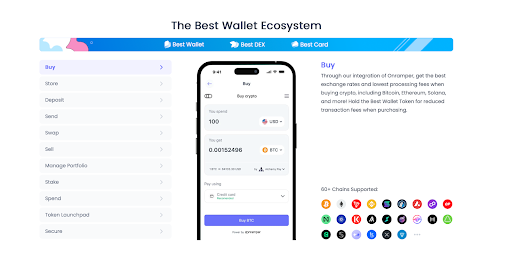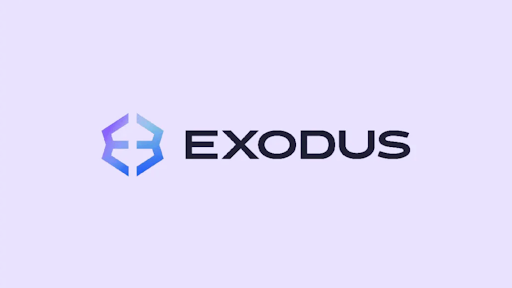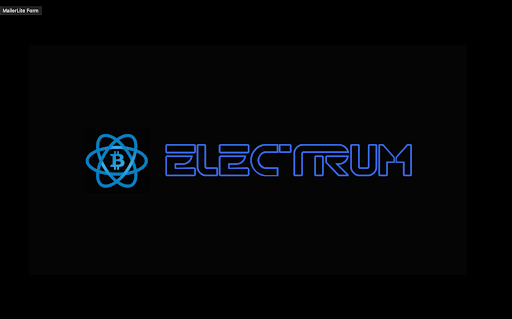Best Anonymous Crypto Wallets to Download Free for 2025
Cryptocurrency users value privacy, but public blockchains can reveal transaction details. Anonymous wallets address this by concealing identities. With regulatory scrutiny rising and privacy wallet usage up 25% in 2024, these tools are critical. Here are the top five options, led by Best Wallet, evaluated for their anonymity features.
Best Anonymous Crypto Wallets for 2025 – Top 5 Wallets
1. Best Wallet – Unmatched Privacy Across Chains
Best Wallet earns its place at the top by delivering a privacy-focused experience that’s hard to rival. Tailored for mobile users, it spans over 60 blockchains and supports more than 1,000 cryptocurrencies without asking for any personal details—no identity checks, no email sign-ups, nothing. You keep full control, with private keys stored and encrypted directly on your device.

Security comes through two-factor authentication, biometric options like fingerprint scans, and thorough encryption from start to finish. Fireblocks, a respected name in crypto protection, provides insurance for your assets, all without requiring user data.
This wallet goes further by accommodating privacy coins like Monero, letting you transact with little trace. It also connects to decentralized exchanges for discreet swaps, dodging the visibility of public records. The $BEST token, which acts as its native currency ties into its setup, giving users a voice in its direction, which often circles back to keeping things private, making Best Wallet one of the best anonymous wallets.
Other sites that have provided a list of the best anonymous crypto wallets have shed light on its strengths.
Several YouTube videos online have also featured the wallet as one of the best options available in the space right now. Jacob Bury, a trending crypto YouTuber was one among the many who praised the platform for its safety and offerings.
There’s even a presale dashboard if you’re into early token grabs, though that’s secondary to its core mission. With its wide reach and tight security, Best Wallet suits anyone wanting a discreet, multi-chain solution.
2. Exodus – User-Friendly Privacy with Broad Appeal
Next in line is Exodus, a wallet that’s earned its stripes with over 4 million downloads since it first appeared years ago. It covers more than 300 cryptocurrencies across networks like Bitcoin, Ethereum, and others, requiring no personal details to begin using it—just download and start. Your private keys stay on your device, locked with local encryption, ensuring no outside party has access.

A standout feature is its integrated exchange, which lets you swap assets directly within the app, cutting down on exposure to external platforms that might demand identification. For those who want an extra layer of security, pairing it with a Trezor hardware wallet creates a cold-storage setup that’s tough to breach.
Still, there are limits to its privacy reach. The exchange logs transactions on public blockchains, where determined analysts could, over time, piece together patterns if they tried hard enough. It also lacks two-factor authentication, a curious omission for a tool in this space, though it doesn’t undermine its basic privacy stance.
The NYSE welcomes @exodus to the podium to celebrate its uplisting to NYSE American! $EXOD https://t.co/tAiZMFcGKd
— NYSE 🏛 (@NYSE) January 8, 2025
The wallet company was also listed on the NYSE sometime ago, which has helped the platform gain more exposure, which has resulted in higher users too.
Available across desktop and mobile platforms, Exodus strikes a balance between ease of use and a reasonable level of anonymity. It’s a strong choice for those managing diverse holdings who want a polished interface without the hassle of identity checks, even if it doesn’t push the boundaries of privacy as far as some alternatives.
3. Trust Wallet – Expansive Coverage with Reliable Discretion
Trust Wallet secures third place, a heavyweight backed by Binance with a user base exceeding 60 million. It supports over 9 million assets across 70-plus blockchains, letting you jump in without submitting any personal information—no forms, no KYC process.

As a non-custodial wallet, it keeps your private keys on your device, protected by encryption and optional biometric security like facial or fingerprint scans. You can stake coins to earn rewards or trade on decentralized exchanges directly, avoiding centralized systems that might track your identity.
Binance’s ownership raises a question for some: could there be a chance of data sharing down the road? Since its launch in 2017, no such incidents have come to light, which maintains its credibility for now.
Users looking to maximize privacy often pair it with a VPN or Tor network to mask their location, a practical step for the cautious. Its real strength lies in its sheer scope—few wallets handle as many assets with such accessibility. It’s not packed with advanced anonymity features, but it offers a dependable foundation for those who need a wide-ranging tool that still respects their desire to stay out of sight.
4. Electrum: Bitcoin’s Lean Privacy Champion
Electrum takes the fourth spot, a wallet that’s been a go-to for Bitcoin users since 2011. Open-source and free of identity requirements, it keeps your private keys on your device, away from anyone else’s reach. It’s designed with a singular focus—handling Bitcoin transactions—and does so with an eye toward discretion.

One of its key tools is CoinJoin, which lets you mix your transactions with others, making it harder for anyone to trace where your funds came from or where they’re going. Running it over Tor hides your IP address, and for the dedicated, setting up your own node means verifying transactions without relying on outside servers.
That control comes with trade-offs. It’s limited to Bitcoin, so if you’re into other coins, you’ll need to look elsewhere. The setup can also feel daunting—configuring nodes or mixing transactions takes some technical efforts, which might leave newcomers scratching their heads.
For Bitcoin enthusiasts who value hands-on privacy and don’t mind the effort, Electrum delivers a sturdy, focused option. It’s not the most versatile, but it holds its own for those committed to keeping their BTC dealings quiet.
5. Wasabi Wallet: Bitcoin Privacy with Focused Tools
Wasabi Wallet rounds out the list, a dependable pick for Bitcoin users who value staying discreet. Designed for desktop use, this open-source, non-custodial wallet requires no personal details—no sign-ups, no identity verification, just a straightforward install. Your private keys are kept on your device, secured with local encryption, ensuring they stay out of anyone else’s hands. It’s tailored to Bitcoin alone, sharpening its privacy features for that one network.

The wallet’s centerpiece is CoinJoin, a method that combines your Bitcoin with others’ in a single transaction, complicating efforts to trace who owns what. It runs this through its own coordinator, though you can pair it with a personal node for extra control.
By default, it uses Tor to route your activity, hiding your location from onlookers. You also get coin control, letting you choose which funds to move, adding a layer of obscurity. The design is no-frills—functional over fancy—but it suits those chasing privacy over aesthetics.
There are trade-offs. CoinJoin involves a small fee and some waiting, and while it boosts anonymity, determined blockchain sleuths might still find clues with enough effort. Its Bitcoin-only scope limits it—if you handle other coins, you’ll need another wallet. Setup is manageable, though it helps to have a bit of technical comfort to make the most of it.
For Bitcoin enthusiasts who want a practical, community-backed way to keep their dealings quiet, Wasabi Wallet delivers a focused set of tools that hold up well against broader alternatives higher on the list.
Why Privacy Still Drives Crypto
Crypto began as a push against oversight—banks, rules, eyes everywhere. But blockchains like Bitcoin’s log every move for the world to see, and studies from 2024 say 70% of those moves can be tied back to real people with enough effort.
That’s where these wallets step in, dodging centralized grip, skipping personal data, and using tricks like mixing or privacy coins to keep you vague. Non-custodial setups mean you’re the only one with the keys. No KYC means no paper trail. Tor or VPNs add another wall.
Nothing’s perfect, though—blockchain sleuths keep getting smarter, and some places demand you report what you do anyway. The 25% jump in privacy wallet use last year shows people care, spooked by breaches and laws creeping closer.
The best anonymous crypto wallets adapt, beefing up encryption, widening coin options, and smoothing out the rough edges so you don’t trade ease for cover. It’s a tug-of-war between freedom and the forces trying to pin it down.
Finding Your Fit
Pick based on what you need:
- Best Wallet blends multi-chain support, tight security, and zero data demands for all-around privacy.
- Exodus pairs a clean look with decent protection for varied coins.
- Trust Wallet covers tons of assets with a steady privacy base.
- Electrum digs into Bitcoin with raw, technical anonymity.
- Wasabi Wallet locks down BTC with specialized depth.
Best Wallet leads in 2025, offering a wide net and strong defenses. The rest carve their niches, but it’s the one to beat for keeping your crypto life quiet.
Stay informed with daily updates from Blockchain Magazine on Google News. Click here to follow us and mark as favorite: [Blockchain Magazine on Google News].
Get Blockchain Insights In Inbox
Stay ahead of the curve with expert analysis and market updates.
latest from tech
Disclaimer: Any post shared by a third-party agency are sponsored and Blockchain Magazine has no views on any such posts. The views and opinions expressed in this post are those of the clients and do not necessarily reflect the official policy or position of Blockchain Magazine. The information provided in this post is for informational purposes only and should not be considered as financial, investment, or professional advice. Blockchain Magazine does not endorse or promote any specific products, services, or companies mentioned in this posts. Readers are encouraged to conduct their own research and consult with a qualified professional before making any financial decisions. The featured image used is just a creative depiction of the title and it does not intend to hurt sentiments of any person or institution. If it hurts anyone sentiments, please do not hesitate to reach out to Blockchain Magazine.

 Bitcoin
Bitcoin  Ethereum
Ethereum  XRP
XRP  Tether
Tether  Solana
Solana  USDC
USDC  Dogecoin
Dogecoin  Cardano
Cardano  Lido Staked Ether
Lido Staked Ether  TRON
TRON  Wrapped Bitcoin
Wrapped Bitcoin  Chainlink
Chainlink  Wrapped stETH
Wrapped stETH  Avalanche
Avalanche  Sui
Sui  Stellar
Stellar  Litecoin
Litecoin  Toncoin
Toncoin  Shiba Inu
Shiba Inu  Hedera
Hedera  LEO Token
LEO Token  USDS
USDS  Hyperliquid
Hyperliquid  Polkadot
Polkadot  WETH
WETH  MANTRA
MANTRA  Bitcoin Cash
Bitcoin Cash  Bitget Token
Bitget Token  Ethena USDe
Ethena USDe  Wrapped eETH
Wrapped eETH  Uniswap
Uniswap  Monero
Monero  NEAR Protocol
NEAR Protocol  Pepe
Pepe  WhiteBIT Coin
WhiteBIT Coin  Aave
Aave  Bittensor
Bittensor  Ondo
Ondo  Aptos
Aptos  Internet Computer
Internet Computer  Dai
Dai  Official Trump
Official Trump  Ethereum Classic
Ethereum Classic  Mantle
Mantle  Tokenize Xchange
Tokenize Xchange  OKB
OKB  Gate
Gate  sUSDS
sUSDS  Sonic (prev. FTM)
Sonic (prev. FTM) 




